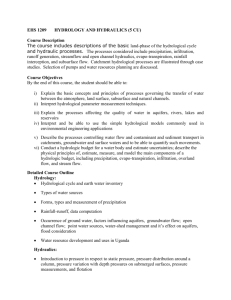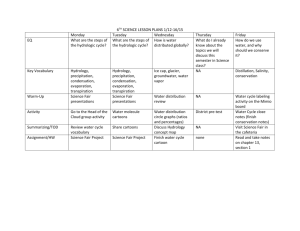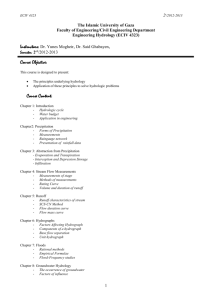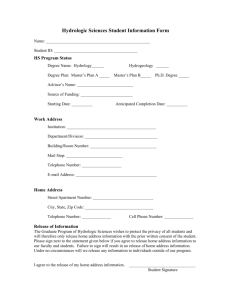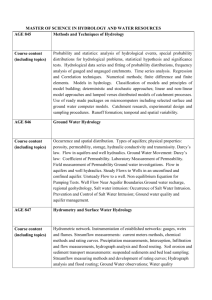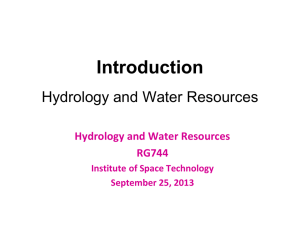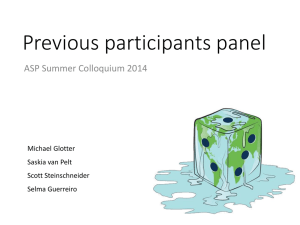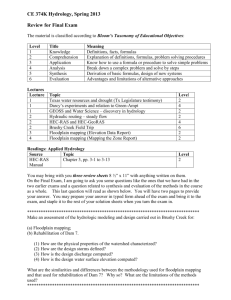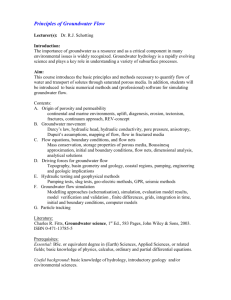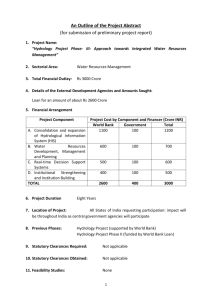Course Description_2013
advertisement
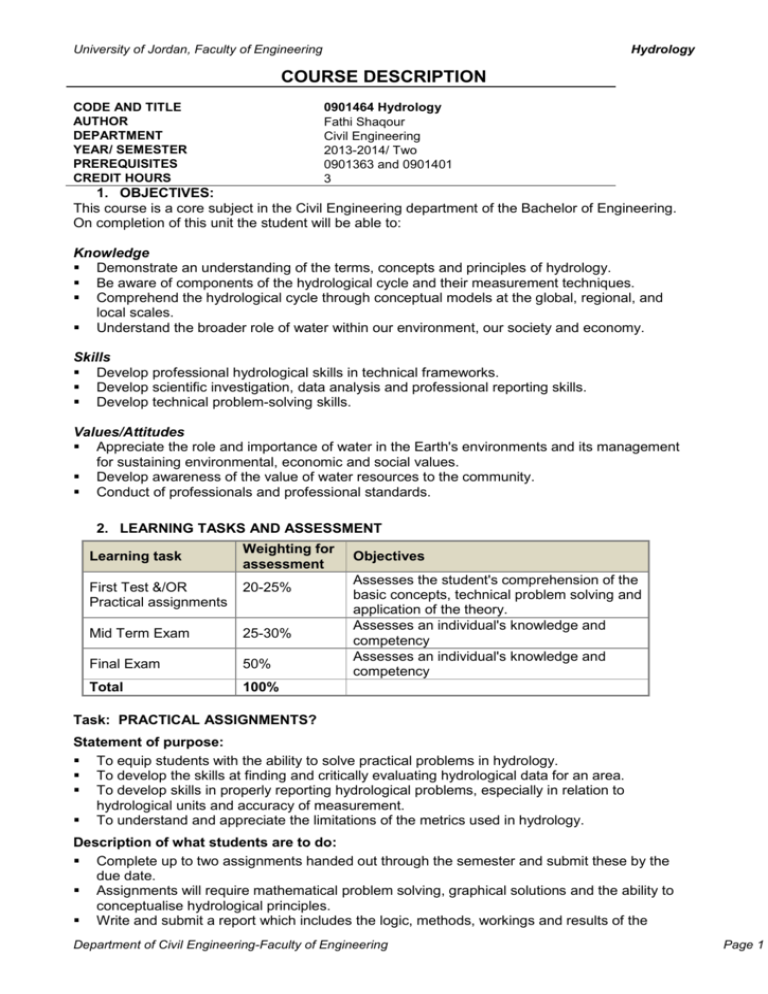
University of Jordan, Faculty of Engineering Hydrology COURSE DESCRIPTION CODE AND TITLE AUTHOR DEPARTMENT YEAR/ SEMESTER PREREQUISITES CREDIT HOURS 0901464 Hydrology Fathi Shaqour Civil Engineering 2013-2014/ Two 0901363 and 0901401 3 1. OBJECTIVES: This course is a core subject in the Civil Engineering department of the Bachelor of Engineering. On completion of this unit the student will be able to: Knowledge Demonstrate an understanding of the terms, concepts and principles of hydrology. Be aware of components of the hydrological cycle and their measurement techniques. Comprehend the hydrological cycle through conceptual models at the global, regional, and local scales. Understand the broader role of water within our environment, our society and economy. Skills Develop professional hydrological skills in technical frameworks. Develop scientific investigation, data analysis and professional reporting skills. Develop technical problem-solving skills. Values/Attitudes Appreciate the role and importance of water in the Earth's environments and its management for sustaining environmental, economic and social values. Develop awareness of the value of water resources to the community. Conduct of professionals and professional standards. 2. LEARNING TASKS AND ASSESSMENT Learning task Weighting for assessment First Test &/OR Practical assignments 20-25% Mid Term Exam 25-30% Final Exam 50% Total 100% Objectives Assesses the student's comprehension of the basic concepts, technical problem solving and application of the theory. Assesses an individual's knowledge and competency Assesses an individual's knowledge and competency Task: PRACTICAL ASSIGNMENTS? Statement of purpose: To equip students with the ability to solve practical problems in hydrology. To develop the skills at finding and critically evaluating hydrological data for an area. To develop skills in properly reporting hydrological problems, especially in relation to hydrological units and accuracy of measurement. To understand and appreciate the limitations of the metrics used in hydrology. Description of what students are to do: Complete up to two assignments handed out through the semester and submit these by the due date. Assignments will require mathematical problem solving, graphical solutions and the ability to conceptualise hydrological principles. Write and submit a report which includes the logic, methods, workings and results of the Department of Civil Engineering-Faculty of Engineering Page 1 University of Jordan, Faculty of Engineering Hydrology assignment problems. Statement of requirements to complete task: Typed, professionally presented report which meets requirements of the University's academic standards. Present the report by the due date. Assessment criteria Correct or appropriate content, method and results. Professional presentation, quality of analysis and demonstrated scientific understanding. Late submission without extension will be penalised. Task: SEMESTER EXAM Statement of purpose: To assess student's knowledge and understanding of the unit subject of hydrology. Description of what students are to do: Sit a written examination on the entire content of the unit. Statement of requirements to complete task: Complete a 2-hour examination at the end of semester. Assessment criteria Correct answers, demonstration of understanding of concepts and principles. Assessment criteria Attendance, participation, adequate working and correctness of answer, professional presentation of submitted work. Diagrams and photos are encouraged. Late submission without extension will be penalised. Academic standards Hydrology is a science. Our understanding of hydrology is developed by adopting the scientific method whereby data is collected by investigation or observation and used to formulate and test hypotheses. It depends on scientists being objective and sharing all their data, methods and ideas with their peers, by publishing their findings. This allows other scientists to further analyse and build on this body of knowledge by which we learn about hydrology. Professional scientists must always acknowledge their sources. Plagiarism is the presentation of the expressed thought or work of another person as though it is one’s own without properly acknowledging that person. The University’s Statute 6.1 Student Discipline and Regulation 6.1.1 Student Discipline make it clear that plagiarising is a breach of student discipline and may incur a range of penalties. The following information on plagiarism is worth reading: http://www.ballarat.edu.au/ard/business/pg_handbook/ch01s03s06.shtml A software package for the prevention and detection of plagiarism can be found at: http://www.ballarat.edu.au/lews/turnitin/index.shtml Guidelines for the presentation of academic work can be found at: http://www.ballarat.edu.au/aasp/student/learning_support/generalguide/ Department of Civil Engineering-Faculty of Engineering Page 2 University of Jordan, Faculty of Engineering Hydrology 3. COURSE OUTLINE Week 1 2 3 4 5 6 7 8 9 10 11 12 13 14 Topic Introduction: The big picture o Definitions o Systems concept: The hydrologic system model o Role of water on earth, water resources and society o Value and uses of water, legislative framework o Hydrologic model classification o Current hydrology topics around the globe o Opportunities, issues and prognoses for careers in hydrology o Value of water and water legislation o Hydrological cycle o Interactions of hydrological cycle parameters Meteorological components and atmospheric water o Atmospheric circulation and water vapour/ temperature and humidity o Precipitation; rainfall o Measurement of precipitation/rainfall o Analysis of rainfall data and problem solving Continue: Meteorological components and atmospheric water o Evaporation; transpiration, evapo-transpiration, interception o Methods of measuring and calculating evaporation and evapotranspiration o Problem solving Surface water components o Definitions: Catchments, overland flow, stream flow …etc. o Measurements, gauging, rational equation and other methods to quantify runoff o Problem solving Surface water components (cont.) o Hydrographs, storm flow and Unit hydrographs o Applications Subsurface water o Unsaturated zone: capillary water, perched water o Saturated zone: groundwater o Infiltration: measurement of infiltration, problem solving MID TERM TEST Groundwater Hydrology o Principles of groundwater hydrology, storage, movement, aquifers, Darcy's Law, heterogeneity and anisotropy Groundwater flow and geology o Recharge, discharge, groundwater flow systems, flow field mapping, geomorphological and geophysical techniques o Bores, bore construction, data sources and knowledge management Aquifer parameters o Aquifer test methods, single bore and multiple bore tests, analysis of the data o Conceptual vs. numerical models, modelling techniques, model parameters Groundwater - surface water interactions o discharge, investigation techniques o groundwater dependent ecosystems Water resources in Jordan Field trip (applications) Water Quality o Water quality, standards, mineral water, contamination, nutrients, salinity o Water contamination and rehabilitation o Water supply, quality and demand issues, extraction, irrigation, urban use Applications #1 o Water uses: irrigation, urban supply, mining o Contaminated sites, landfills (guest lecture) o Aquifer storage and recovery, recycling, desalination Applications #2 o Geothermal energy o Geotechnical aspects of groundwater, dewatering, other issues o Dams, reservoirs, landslides, foundations, mine dewatering Revisions Department of Civil Engineering-Faculty of Engineering Page 3 University of Jordan, Faculty of Engineering Hydrology REFERENCES Highly recommended Viessman Warren, Jr. and Lewis G.L. (2003) Introduction to Hydrology. Prentice Hall Serrano, S.E. (1997) Hydrology. Hydro Science Inc. Davie, Tim (2003) – Fundamentals of Hydrology. Routledge publishers Also very useful: Frieze, R.A. & Cherry, J.A. (1979) - Groundwater. Prentice-Hall Inc. Domenico P.A. & Schwartz F.W. (1990) - Physical and chemical hydrogeology. Wiley. Price, Michael (1996) - Introducing groundwater. Nelson Thomes publishers. Fetter, CW (2001) Applied Hydrogeology. Merrill Publishing Company Ward, AD & Trimble (2004) Environmental Hydrology 2nd edition. Lewis Publishers Ladson, Anthony (2008) Hydrology: an Australian introduction. South Melbourne, Vic. : Oxford University Press Heath, R.C. (1989) Basic Ground-Water Hydrology. USGS Geological Water-Supply Paper 2220 (available on unit website as electronic copy) Check Google books for these. http://books.google.com.au/books Journals: Journal of Hydrology Hydrology and Earth System Sciences Hydrological Processes Hydrogeology Journal Groundwater Natural Resource Management Australian Journal of Soil and Water Conservation Water Resources Research Agricultural Water Management Australian Meteorological Magazine It is recommended that students who have life circumstances or personal limitations which may affect their course of study, should raise these with their lecturer as early as possible. Department of Civil Engineering-Faculty of Engineering Page 4
